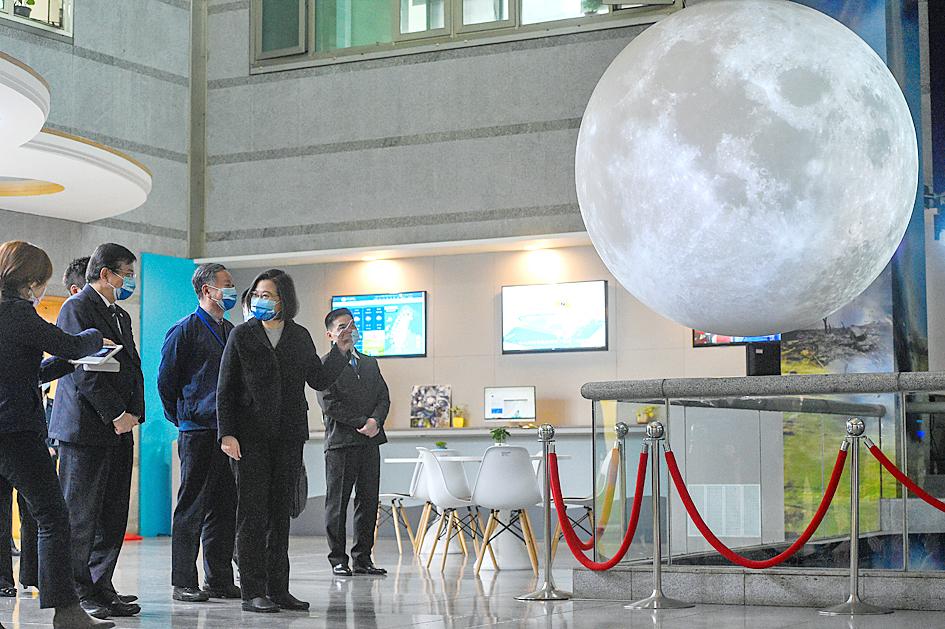President Tsai Ing-wen (蔡英文) yesterday expressed “empathy” for Ukraine’s situation, likening it to threats Taiwan is facing from China and saying that such disputes cannot be resolved by force.
The situation at the Russia-Ukraine border needs close attention, Tsai told a high-level national security meeting in Taipei.
“Taiwan has been facing military threats and intimidation from China for a long time. Therefore, we empathize with Ukraine’s situation and support the efforts of all parties involved to maintain regional security,” the Presidential Office cited her as telling the meeting.

Photo: George Tsorng, Taipei Times
Tsai has asked the National Security Council to set up a working group on the Ukraine situation to assess possible effects on Taiwan’s national security, the Presidential Office said.
Peace and stability across the Taiwan Strait and in the Indo-Pacific region is not only the shared responsibility of all parties involved, but also the common expectation of the international community, Tsai said.
Employing the military is “not an option to resolve disputes — this is a universal truth,” she said.
The meeting also touched upon the nation’s COVID-19 situation, with Tsai calling on government officials to stay vigilant during the Lunar New Year holiday.
As the Omicron variant of SARS-CoV-2 spreads with alarming speed, the situation remains severe, she said.
Officials should be on guard, as increased traveling during the holiday might lead to a surge in cases, she said.
However, the government is confident that Taiwan has enough medical resources, including hospital beds, testing capacity and medical supplies, to deal with the COVID-19 pandemic, she said, adding that vaccines and treatments against the virus would be delivered as scheduled.
There is no need for alarm, she said, urging Taiwanese to get booster shots, as they greatly reduce the risks of severe COVID-19 symptoms and death.
People eligible for vaccines or boosters should make appointments as soon as possible, and try to convince vaccine-hesitant friends and family members, especially elderly people, to do the same, Tsai said.
Meanwhile, officials should work to stabilize supplies, prices and the stock market, she said.
Inflation is a cause for concern worldwide, she said, urging government agencies to use every policy tool at their disposal to stabilize prices, especially of daily necessities.
All agencies should remain vigilant, as unforeseen global events and the pandemic might cause economic turmoil, she said.

EUROPEAN TARGETS: The planned Munich center would support TSMC’s European customers to design high-performance, energy-efficient chips, an executive said Taiwan Semiconductor Manufacturing Co (TSMC, 台積電), the world’s largest contract chipmaker, yesterday said that it plans to launch a new research-and-development (R&D) center in Munich, Germany, next quarter to assist customers with chip design. TSMC Europe president Paul de Bot made the announcement during a technology symposium in Amsterdam on Tuesday, the chipmaker said. The new Munich center would be the firm’s first chip designing center in Europe, it said. The chipmaker has set up a major R&D center at its base of operations in Hsinchu and plans to create a new one in the US to provide services for major US customers,

The Ministry of Transportation and Communications yesterday said that it would redesign the written portion of the driver’s license exam to make it more rigorous. “We hope that the exam can assess drivers’ understanding of traffic rules, particularly those who take the driver’s license test for the first time. In the past, drivers only needed to cram a book of test questions to pass the written exam,” Minister of Transportation and Communications Chen Shih-kai (陳世凱) told a news conference at the Taoyuan Motor Vehicle Office. “In the future, they would not be able to pass the test unless they study traffic regulations

‘A SURVIVAL QUESTION’: US officials have been urging the opposition KMT and TPP not to block defense spending, especially the special defense budget, an official said The US plans to ramp up weapons sales to Taiwan to a level exceeding US President Donald Trump’s first term as part of an effort to deter China as it intensifies military pressure on the nation, two US officials said on condition of anonymity. If US arms sales do accelerate, it could ease worries about the extent of Trump’s commitment to Taiwan. It would also add new friction to the tense US-China relationship. The officials said they expect US approvals for weapons sales to Taiwan over the next four years to surpass those in Trump’s first term, with one of them saying

‘COMING MENACINGLY’: The CDC advised wearing a mask when visiting hospitals or long-term care centers, on public transportation and in crowded indoor venues Hospital visits for COVID-19 last week increased by 113 percent to 41,402, the Centers for Disease Control (CDC) said yesterday, as it encouraged people to wear a mask in three public settings to prevent infection. CDC Epidemic Intelligence Center Deputy Director Lee Chia-lin (李佳琳) said weekly hospital visits for COVID-19 have been increasing for seven consecutive weeks, and 102 severe COVID-19 cases and 19 deaths were confirmed last week, both the highest weekly numbers this year. CDC physician Lee Tsung-han (李宗翰) said the youngest person hospitalized due to the disease this year was reported last week, a one-month-old baby, who does not